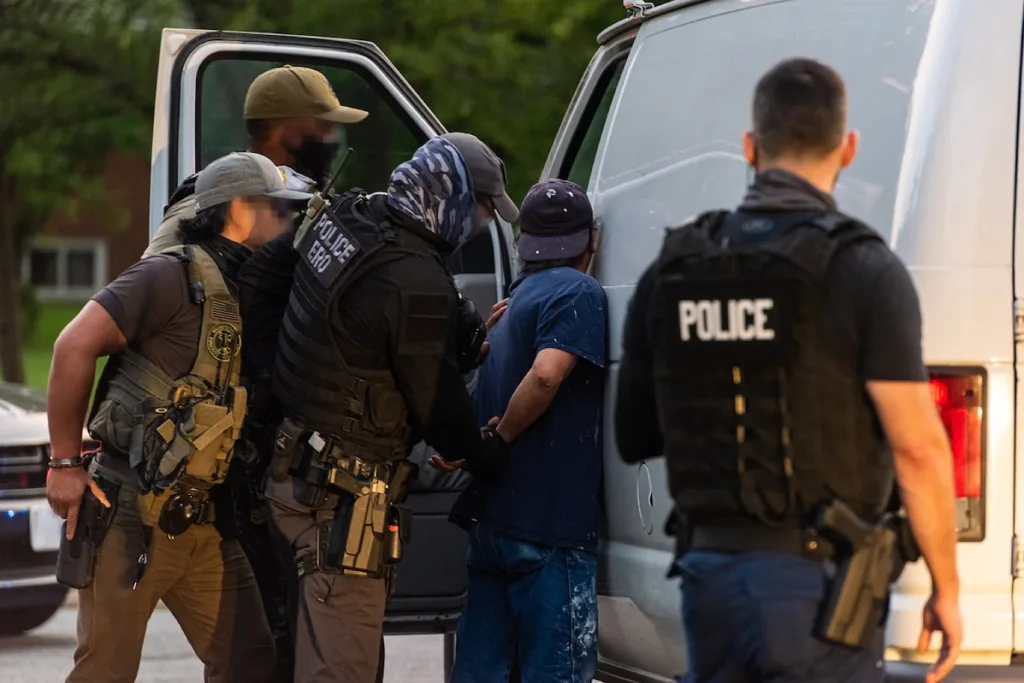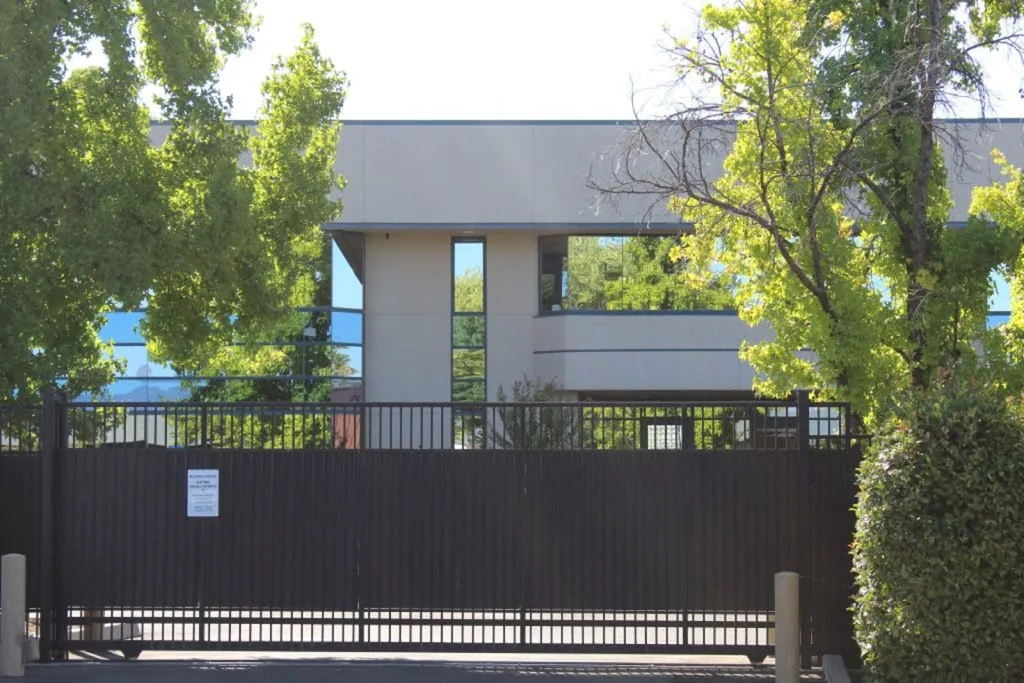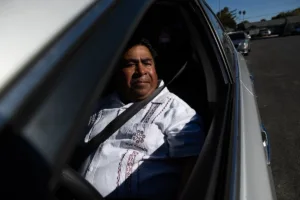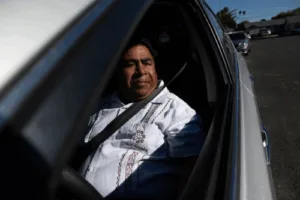Sep 29, 2025
ICE agents told “Jorge” his choice was years in a detention center or self deportation. He chose the latter, leaving heartache and tears in his wake.

Enforcement and Removal Operations (ERO) officers arrest a migrant in the state of Virginia. Image via Flickr.
CHICO, Calif. — Picture this: It’s a hot day in the North State in early July, and after a 3 p.m. meeting with an attorney, a Glenn County personal trainer stops at a gas station to fill his tank. Suddenly, several vehicles including a Ford Explorer pull up around him. Eight men surround him and tell him he’s under arrest.
That’s roughly how the terrible odyssey back to Mexico began for a Chico-area man who opted for deportation after an interview at Redding’s Immigration, Customs & Enforcement (ICE) sub-field office. ICE gave him a couple of options, neither of which sounded good: Spend what might be years in an overcrowded detention cell or deport.
In a telephone interview from Mexico, the former personal trainer asked for anonymity to protect his safety in a western Mexican state that has become infiltrated with cartel activity. It has been 32 years since he emigrated with his parents and siblings to the United States; Mexico is a different country than the one he left at age 13.
Now, at 45, far from parents, siblings and children, all of whom are U.S. citizens, he’s starting over. “I miss my life,” said “Jorge,” whose name was changed in this story. “I miss everybody; I don’t know anybody here. You really feel like, ‘What the hell am I doing here?’”
Jorge obtained a valid Social Security number as a dependent minor – his father had been working and paying taxes in this country for years — but he never obtained citizenship or permanent residency. That makes his family, like many Latino families, mixed status, and like many, torn apart by “targeted enforcements.”
Targeted enforcements have produced agonizing separations and hardship when ICE has arrived in search of an individual who will be detained. Many of the non-citizens who have been detained have been subject to expedited removal – deportation without an immigration court hearing – or pressed, as Jorge was, to agree to quick deportation.
On a property in the rural Northern Sacramento Valley, Jorge occupied a small house adjacent to two other family houses. His parents founded two successful businesses, making their immigration story one of success built on family bonds. Family members gave interviews to this reporter with the understanding that only their first names would be used.

The Immigration and Customs Enforcement (ICE) sub-field office in Redding, California, where Jorge was held before agreeing to self deport. (Photo by Madison Holcomb)
A traumatic journey to Mexico
Jorge loves to sing, and loves horses. His older sister Ana fondly describes him as a “very buff guy,” and showed this reporter a video of him in a cowboy hat performing with a mariachi band. He trains horses to dance in parades and shows in the Mexican tradition.
Like most immigrants who have been swept up in the ICE dragnet this year, he has no record of violent criminal activity. The Cato Institute reported in June that since October 2024, more than 93 percent of immigrants who had been booked into detention had no violent crime convictions.
His family says he had an outstanding traffic warrant because of an unpaid speeding ticket, and an unresolved legal problem related to child support. On the afternoon that he was detained, Ana took him to see an attorney to begin the process of resolving those issues. Maybe then he could apply for legal residency based on family ties, she thought.
“I told him, ‘They’re going to be picking people up,’” Ana said. “You need to get a lawyer and re-open the case. That’s why we went.
“He was with me around 3 in the afternoon,” she said. “At close to 5 he calls my dad and tells him he had been pulled over. When we arrived nobody was there, just his vehicle. People started calling us, telling us they had taken pictures when my brother was arrested and taken into custody.”
Two hours later, the family received another call, this time from ICE’s Redding office, where Jorge was debating whether to agree to deportation. Jorge recalled the interview with agents, and though he says they were cordial, they pressed the argument that deportation was his best option.
“They scare you,” Jorge said. “They tell you you’re going to go to jail for 10 years. They were going to send me to Colorado or Miami, and I was going to be there for months or years in jail” until he could see a judge.
Later that night he called his family and said he had agreed to “sign the document” – he would accept deportation.
“They were telling him, ‘The worst thing you could do is wait,’” Ana said. “He would be put in a cell with 20 people. They told him, ‘We don’t know if you’ll go to Colorado or the new (detention center) in Florida.’”
That same night, with his feet, hands and waist shackled, Jorge was placed in what he now calls a “dog van.”
His ride to Tijuana was punctuated by stops in Sacramento, Fresno, Bakersfield and San Diego. He was placed in a cell while officers rounded up more migrants. He became increasingly alarmed at how the detainees were treated.
“It’s unhuman what they’re doing,” Jorge said. “They act like they’re not dealing with humans. They look at you like you’re diseased, with hate.”
As they headed into the southern San Joaquin Valley, there were eight men on each side in the back of the van – “you can barely move” — which he said had become intolerably hot. “You feel like you’re going to die suffocating in there.
“They’d stop the van and it was like 120 degrees, and I’d say ‘Por favor, por favor, open the door.’” They were up there laughing and talking about their normal lives.”
Some of the detainees were defenseless because they spoke so little English, Jorge said. “They need to have somebody in there who speaks Spanish. There are guys who don’t go to the restroom because they can’t ask.
“There were people who were really traumatized; they have chains on their feet and hands, they’re crying, they’re not allowed to call nobody. Trump is making you feel worse than a criminal.”
When the van stopped in or near Bakersfield, his family says the men were placed in a cell, but neither they nor Jorge could identify the detention center. (There are several Kern County detention centers; Mesa Verde and Golden State Annex have been accused of mistreatment.)






